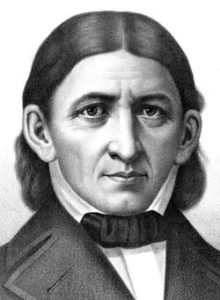Friedrich August Froebel

Table of Contents
Introduction
Friedrich August Froebel was born on April 21,1782 in the village of Oberweisback in South Germany. Two factors which influenced the neglected childhood of Froebel is the religious influence of father and the nature. He introduced the idea of KINDERGARTEN for pre-primary education of young children before he died in 1852.
Main Principles of Froebel’s Philosophy
The following are the main principles of his philosophy :
- Law of Unity : According to Froebel there is one eternal law – ” The Law of Unity” – that governs all things, men and nature. God is the one ground of all things. All things, animate or inanimate, originate from God. All things come from the Divine Unity (God) and have their origin is in the Divine Unity. All things live and have their beings in and through the Divine Unity.
The Divine Unity is three fold : –
(i) Unity of Substance : – There is only one substance from which all things come.
(ii) Unity of Origin : – There is one source, that is God, from whom all things come.
(iii) Unity of Purpose :- All things strive towards perfection i.e. God.
2. The Principle of Development :
Everything is marching towards the same Unity. Everything is changing, growing and marching towards the same Unity. Froebel maintained that mind evolves from within. All child can become and can be attained only through the development within. By ‘development’, he meant – an increase in quantity, increase in complexity, an improvement in power, skill and variety in the performance.
3. The Principle of Self-Activity :
It is only through Self-Activity that real growth and development is possible. According to Froebel, forced activity is artificial and unnatural.
4. Development through Social Institutions :
According to Froebel, “The school is a miniature society”. He remarked, ” No community can progress while the individual remains behind”.
Froebel’s Meaning of Education
“Education should lead and guide man to clearness, concerning himself and in himself to peace with nature and to unity with God” – Froebel
Education consists in leading man, as a thinking intellectual being growing into a self-consciousness, to a pure and unsullied, conscious and free representation of the inner law of Divine Unity. and in teaching him means thereto.
Froebel and Educational Principles/Aims of Education
1. To realise Unity in Diversity : According to Froebel, there is only one eternal law – The Law of Unity – that governs all things, men and nature. Man and nature are one. They are simply the different forms of the Unity which is God. There is Unity in Diversity and Diversity in Unity.
Human education requires the knowledge and appreciation of religion, nature and language and their mutual interaction.
2. Concept of Play : the chief means of education is the child’s own activity. Play is essential factor in the growth of the child. The free and unfettered natural development of the child takes place through Play.
3. To Foster Creativity of Child : Education should be in conformity with child’s nature and needs. The child should be educated in a free atmosphere. Freedom from obedience to self-imposed law.
4. Social Development of Child : Froebel stressed the social aspect of education. He believed that all social institutions like the home, the school etc are the agencies of development of the individual wherein he is to realise the Unity in Diversity.
5. To Stimulate the Imagination : Froebel devised songs, gestures and construction as the chief means of stimulating the imagination of the child.
6. Development According to Stages : Froebel has recognised four stages of an individual and development from the point of education .
(a) In Infancy, Froebel emphasises the sensory development.
(b) In Childhood, aims of education is for free and natural development through the concept of play.
(c) In Boyhood, the aim of education should be vocation or work oriented.
(d) At Youth, the aim of education should be the all round development of the child.
Froebel and Curriculum
The Curriculum, according to Froebel, consists of five main divisions :
(a) Religion
(b) Natural Science
(c) Languages
(d) Expressional Work
(e) Arts and Objects of Art
Let us discuss the above divisions briefly :
Religion : Religion should be the basis of all education. According to Froebel’s curriculum, no other knowledge is possible without it.
Natural Science : Froebel says, nature is the manifestation of God. Insight into the nature law that governs human life. He emphasised the study of Mathematics as a branch of Natural Science. Mind and Mathematics are inseparable as the soul and religion.
Language : According to Froebel, education cannot be complete without the study of language. Language is necessary for expressing oneself.
Expressional Work : Froebel believed that there is need for the expression of soul in outward form. This expression may take the form of singing, drawing, painting and modelling.
Froebel and Method of Teaching
Froebel advocated for free movement and work of children .
1. Froebel introduced Gifts and Occupation as the new method of teaching.
2. Teacher should apply Play-Way method of teaching. Teacher should guide and suggest about the occupational work.
3. Singing of song with a view to help the child to form appropriate ideas.
4. The teacher should be like a gardener who look after the little human plants and water them to grow to beauty and perfection.
Froebel and Role of Teacher
The teacher is like a gardener who carefully nurses and protects children in order to secure their full and free development.
1. The teacher plays the role of a gardener who looks after the tender plants.
2. He provides an environment of life and freedom.
3. Teacher should plans his work very carefully and demonstrates the Play-Way activity.
4. Teacher should always keep in mind the chief objectives which gifts and songs would serve.
5. The teacher is not to remain passive. He has to suggest the idea of occupation when gifts are offered to children.
6. He may also sing a song with a view to help the child to form appropriate ideas.
7. The teacher should sympathetically inculcate values like love, sympathy, humility, co-operation and obedience to elders.
Froebel’s Contribution in the Field of Education
Establishment of Kindergarten




4 thoughts on “Friedrich August Froebel”